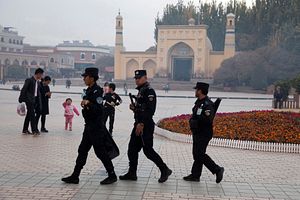Whether it be repression and re-education of Muslims in China’s far-western Xinjiang region, burning Christian churches in coastal Zhejiang province, or the destruction of Buddhist monasteries in Tibet, one common thread ties these events together: the Chinese Communist Party (CCP) looks down on religion. Official Chinese policy, recently renewed and refreshed, views organized religion and a belief in any god as “spiritual anesthesia.”
The received wisdom for decades has been that the CCP’s control over religious piety and practice is based on fear. Fear that believers will follow their god rather than their Party. Fear that the leadership of the Party will be undermined by heretical ideas of democracy emanating from religious teachings. Fear that the Party could fall to religious zealots, extremists who would take the rest of the nation with them, destabilizing China irrevocably.
On the ground in China for much of the last three decades, though, it has never looked, felt, or sounded as if Communist Party members themselves fear religion. On the contrary, it has always appeared to this observer that they view religion, and those who succumb to it, with bemusement combined with barely concealed disdain.
In short, much of officialdom sees religion and a belief in God as beneath them.
One PLA colonel, who had been posted to Tibet for nine years in the 1970s and 1980s, said of the Chinese presence in Tibet, “We had to save them. They were often naked. They were superstitious and worshiped wooden statues. They were very backward people who needed us to improve their lives. This was our duty.” He was speaking with utter sincerity.
In Beijing, as long ago as the 1980s, foreigners received warnings from local officials to stay away from areas of the city inhabited by Uyghurs and other Muslims. “They’re dangerous people who take drugs,” was the admonition. “They carry knives and will cut your throat.”
As for Christianity, those who practice it in China are regularly mocked and face discrimination in a myriad of ways. Even senior CCP members who have converted admit there are negative repercussions, as a cabinet-level vice minister did in speaking with me in late 2016.
It would be easy to blame Chinese officialdom for such crass prejudice and bigotry. It would also be pointless. Anti-religious, atheistic principles are part and parcel of the formation and foundation of the Communist state, going back to its very roots.
It is common knowledge that Marx proclaimed that “religion is the opiate of the masses.” Perhaps less well-known is that he expanded upon the idea.
“Communism,” Marx wrote in 1844, “begins from the outset with atheism.”
Chinese officialdom doesn’t fear religion itself because it doesn’t see its intrinsic value. Yes, the Party is always girded against the behavior that religion may inspire, from rebellious thought to outright revolt. And it dislikes having to deal with international pressure to improve its religious rights record. But fear is a small component of this. It is difficult to fear the power of something you do not respect.
This leads to the issue of Xinjiang today. Now that Beijing has come out and retroactively legalized the very re-education camps that officials recently claimed did not exist, officials are lauding the motives and means of the facilities.
As the South China Morning Post reports, Xinjiang governor Shohrat Zakir described the camps as “’professional vocational training institutions’ that focus on ‘the country’s common, legal knowledge, vocational skills, along with de-extremization education.’”
“The centers are for ‘people influenced by terrorism and extremism’ who are suspected of minor criminal offences that do not warrant criminal punishment,” Zakir said, without disclosing how many people had been sent to the camps, or how long they had been held there.
But, as the SCMP reports, previous detainees have said that they were forced to “denounce their faith and pledge loyalty to the ruling Communist Party.”
If you think that the Chinese authorities in Xinjiang are spouting a story that they don’t really expect anyone to fall for, think again. More than likely, they completely believe their own spin (see again the PLA colonel’s remarks on Tibet). And Chinese officials likely will be surprised, yet again, at why few in the wider world buy in.
Almost exactly one year ago, the CCP issued warnings to Party members to refrain from prayer to God, and worship of Buddha, “because communism is about atheism and superstition is at the root of many corrupt officials who fall from grace.”
Citing superstition and religion in the same breath, the People’s Daily article continued, “Superstition is thought pollution and spiritual anesthesia that cannot be underestimated and must be thoroughly purged.”
The root of the problem in international discussion with China on religious rights is not a legal one, nor a cultural one. It is an ideological one. How does one convince a ruling party whose own edict for itself is to officially renounce religion to protect and respect the rights of others who wish to practice it?

































